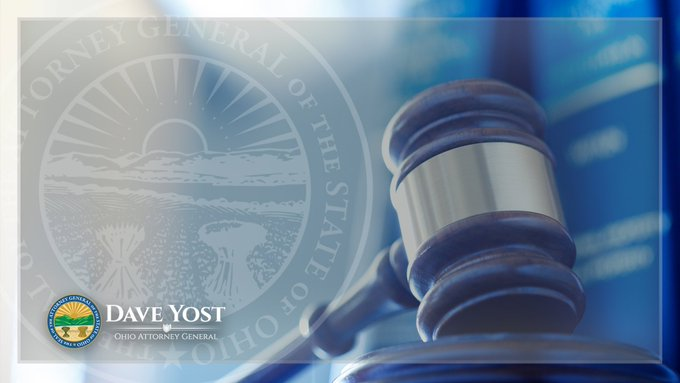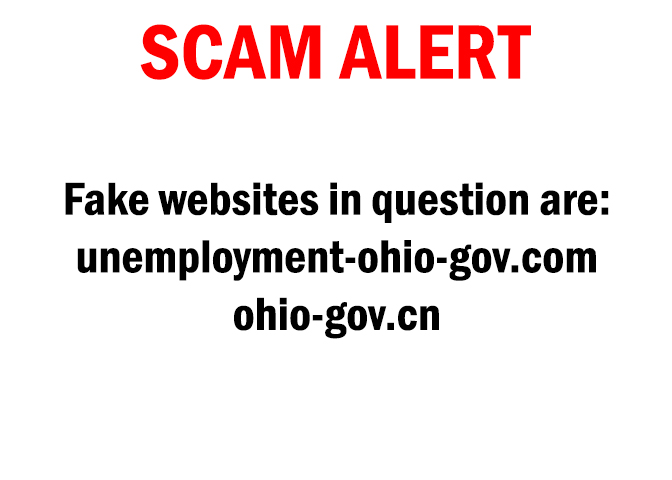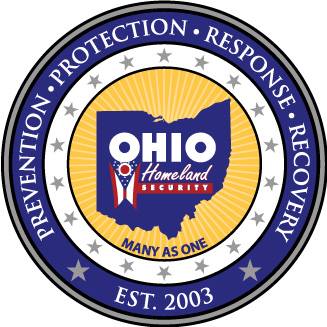
by Wayne Ohio | Jan 11, 2022 | Blog, Uncategorized
COLUMBUS, OH, Jan. 11, 2022 — Ohio Attorney General Dave Yost today urged the Federal Communications Commission (FCC) to help stop the flood of foreign-based illegal robocalls that attempt to scam Americans.
Today’s letter sent by AG Yost and a bipartisan group of 51 attorneys general calls for the FCC to require gateway providers – the companies that allow foreign calls into the United States – to take steps to reduce how easily robocalls have been able to enter the U.S. telephone network, including implementing STIR/SHAKEN, a caller ID authentication technology that helps prevent spoofed calls.
“The main gatekeepers at the front doors are working to keep these people out,” Yost said. “We need the gatekeepers to the back doors and the windows to get in the game.”
Gateway providers should be required to implement this technology within 30 days of it becoming a rule to help eliminate spoofed calls and to make sure that international calls that originate from U.S. telephone numbers are legitimate. In December, Yost and a coalition of 51 attorneys general successfully helped to persuade the FCC to shorten by a year the deadline for smaller telephone companies to implement STIR/SHAKEN.
The attorneys general are asking the FCC to require these gateway providers to take additional measures to reduce robocalls, including:
Responding to requests from law enforcement, state attorneys general, or the FCC to trace back calls within 24 hours.
Blocking calls when providers are aware of an illegal or likely fraudulent caller.
Blocking calls that originate from numbers that are on a “do not originate” list – such as government phone numbers that are for incoming calls only.
Ensuring that foreign telephone companies they partner with are ensuring that calls are being made from legitimate numbers.
The attorneys general are also encouraging the FCC to require all phone companies to block calls from a gateway provider if it fails to meet these requirements. Illegal robocalls are a scourge – in 2020, Americans lost more than $520 million through robocall scams.
Attorney General Yost is joined in sending this letter to the FCC by the Attorneys General of Alabama, Alaska, Arizona, Arkansas, California, Colorado, Connecticut, Delaware, District of Columbia, Florida, Georgia, Hawaii, Idaho, Illinois, Indiana, Iowa, Kansas, Kentucky, Louisiana, Maine, Maryland, Massachusetts, Michigan, Minnesota, Mississippi, Missouri, Montana, Nebraska, Nevada, New Hampshire, New Jersey, New Mexico, New York, North Carolina, North Dakota, Oklahoma, Oregon, Pennsylvania, Rhode Island, South Carolina, South Dakota, Tennessee, Texas, Utah, Vermont, Virginia, Washington, West Virginia, Wisconsin, and Wyoming.

by Wayne Ohio | Nov 22, 2021 | Blog
COLUMBUS, OH, Nov. 22, 2021 — With the holiday shopping season upon us, Ohio Attorney General Dave Yost is warning consumers that illegal robocalls are trying to ruin Christmas by posing as a legitimate business such as Amazon, Apple, or PayPal to steal your money.
These scammers call out of the blue and suggest – under the guise of wanting to help remedy the situation – that a large purchase has been charged to your credit card.
“Legitimate companies don’t do business this way, so just hang up,” Yost said. “These impostors want to get you on the line and cause panic so you cough up personal information. My hope is that you will answer by ending the call.”
According to the Federal Trade Commission (FTC), various Amazon impersonation scams – many involving claims that a consumer has ordered an expensive product or service – are filling phone lines throughout the country.
The “representative” then persuades the consumer to give him or her remote access to the consumer’s device so the “representative” can issue a “refund.” Instead, the scammer gains access to the consumer’s personal identifying information.
In a variation of the scam, the fraudster persuades the consumer to buy gift cards as a way of “stopping” the unauthorized purchase.
On Amazon’s website, company guidelines make clear that Amazon would never call a customer to seek personal information or discuss a refund that the customer isn’t already expecting.
The Ohio Attorney General’s Office offers these tips to help consumers deal with business impostor scams:
- Hang up if you receive a cold call from someone claiming that you have purchased an item from Amazon or another popular online retailer. Do not call back the number on your caller ID or the phone number mentioned in the message. Instead, if you are concerned about the supposed purchase, contact the retailer using its legitimate phone number or email address. Customer service contact information can typically be found on the company’s website.
- Carefully examine the details of your online account purchases and credit card bills for any unauthorized charges. If you see an unauthorized charge, report it immediately to your credit card company.
- Never allow a stranger to remotely access your smartphone, tablet, or computer. If the caller claims to need remote access to process a refund, it’s a scam.
- Be highly suspicious of requests from a stranger to buy gift cards as payment for any product or service as part of a “refund” process, or to allegedly help stop fraud from a third party. Know that once you disclose a gift card’s PIN to someone, that person will be able to access the money on the card.
- To report a scam, contact the legitimate retailer through the contact information on its website and the Ohio Attorney General’s Help Center.
- If you’ve fallen victim to a business impostor scam by disclosing personally-identifying information, download the Ohio Attorney General’s ID Theft Basics publication and visit www.identitytheft.gov for help on how to proceed.
Consumers who suspect an unfair or deceptive sales practice should contact the Ohio Attorney General’s Office at www.OhioProtects.org or 800-282-0515.

by Wayne Ohio | Apr 29, 2021 | Blog
COLUMBUS, OHIO, Apr. 29, 2021 – Ohio Department of Job and Family Services (ODJFS) Interim Director Matt Damschroder is alerting the public of fake websites that closely mirror the agency’s official website that are attempts to steal personal and banking information. The addresses of the fake websites in question are: unemployment-ohio-gov.com and ohio-gov.cn.
“We know that individuals are receiving text messages and emails that link to these phony websites. It’s important to pay attention to know whether they are legitimate,” said Damschroder. “Please look closely before clicking sites that look like the real deal but aren’t.”
Account security is a top priority for the State of Ohio. Ohio Attorney General Dave Yost informed ODJFS about the fake site, unemployment-ohio-gov.com. Their review found that a Russian server houses the website, using a Chinese domain name. Customers alerted ODJFS to the illegitimate site ohio-gov.cn.
To avoid potential fraud Ohioans should:
Ignore all unsolicited text messages and never click on hyperlinks in emails or text messages that look suspicious.
Log in each week to your account and review personal information such as physical address, email address, and banking information.
Remember that ODJFS will not contact you to ask for your username or password.
If individuals notice a change in their account information, they should:
Report immediately by calling 833-658-0394. ODJFS will then work with you to verify your identity and provide you with next steps, such as changing your Personal Identification Number (PIN) and reporting the theft to law enforcement.
ODJFS continues to work closely with the Ohio Attorney General’s Office, the U.S. Department of Labor’s Office of Inspector General and the FBI’s Cyber Crime Unit to shut down fraudulent activities and identify and apprehend criminals.

by Wayne Ohio | Feb 19, 2021 | Blog
COLUMBUS, OH, Feb. 19, 2021 – The Ohio Department of Public Safety has received reports of a possible scam being perpetrated on Ohioans today from scammers claiming to be from Ohio Homeland Security (OHS).
Ohio residents have reported receiving phone calls from scammers claiming to be from OHS and informing the call recipients that their identities had been stolen. Caller ID on these calls indicates the calls originated from the OHS main line 614-387-6171, but they did not; the Ohio Homeland Security main line was spoofed. Spoofing is when a caller deliberately falsifies the information transmitted to your caller ID display to disguise their identity.
“If you receive these calls, don’t fall for this scam,” said Ohio Homeland Security Executive Director Brian Quinn. “Hang up immediately and report it to either your local law enforcement or the Statewide Terrorism Analysis and Crime Center (STACC) at 1-877-647-4683.”
Ohio Homeland Security, a division of the Ohio Department of Public Safety, does not investigate personal identity theft and would not make these kinds of phone calls to Ohio residents.
Do not fall victim to telephone scams. Tips to protect yourself from telephone scams include:
- Register your phone number with the National Do Not Call Registry.
- Be wary of callers claiming that you’ve won a prize or vacation package.
- Hang up on suspicious phone calls.
- Be cautious of caller ID.

by Wayne Ohio | Dec 15, 2020 | Blog
COLUMBUS, OH, Dec.15, 2020 — Ohio Attorney General Dave Yost is cautioning Ohioans to look out for COVID-19 vaccine-related scams that will occur as the vaccine is distributed beginning this week.
“A single dose of information can vaccinate you against fraud,” Yost said.
For example, consumers could see scammers impersonating distributors, providers, or local health department claiming to need personal information such as a Social Security number to get on a list to receive a COVID-19 vaccine.
Other scammers could pretend to be able to help consumers jump to the front of the line to get a vaccine, but ask for advanced payment to secure their place in line. These communications could come through email, phone calls, postal mail, text message, or even through social media accounts.
Do not fall for these scams.
Also, reports indicate that cards may be distributed to consumers that have been provided the first dose of a two-dose vaccine. These will likely be used to simply remind consumers to get their second dose, not as official “passports” to gain entry into bars, restaurants, or other public areas, or to bypass public health orders. Therefore, any attempts to buy these cards will be fruitless.
Do not fall for these scams.
Early in 2020, published reports warned consumers to have their guard up when going online to receive information for products and services designed to help protect against COVID-19. In reality, computer hackers were reportedly sending spam emails with links that were designed to infect consumers’ computers with malicious software, some of which may steal personal information or passwords stored on their devices.
Within the first week of the COVID-19 lockdown in March, scammers started emailing, calling, and texting Ohioans trying to steal their identity or money, according to data from Yost’s Constituent Services Section.
Some of those scams asked people to pay for advice on how to treat COVID-19, pay for access to care and to give personal information in order to get medication or prevent infection.
To date, Yost’s office has received 39 complaints of potential COVID-19-related scams.
The Ohio Attorney General’s Office recommends several tips to help consumers avoid potential virus and vaccine-related scams:
Verify any vaccine-related information with legitimate news reports. Double-check any new “too-good-to-be-true” news or claims. You may wish to consider contacting your family doctor, your local health department, or the statewide Ohio Department of Health’s COVID-19 call center (1-833-427-5634) to check on issues you are unsure about.
Look for some of the red flags of a scam, such as being asked to wire money or send a prepaid money card or gift card to a stranger; being pressured to act immediately, or being told to buy a product or service where the company refuses to provide any information in writing. Also, look out if you’re asked to keep conversations a secret.
You likely will not need to pay anything out of pocket to get the vaccine during this public health emergency. You can’t pay to put your name on a list to get the vaccine. You can’t pay to get early access to the vaccine.
No one from a vaccine distribution site or health care payer, like a private insurance company, will call you asking for your Social Security number or your credit card or bank account information to sign you up to get the vaccine.
Consumers who suspect an unfair business practice or want help addressing a consumer problem should contact the Ohio Attorney General’s Office at www.OhioProtects.org or 800-282-0515.




